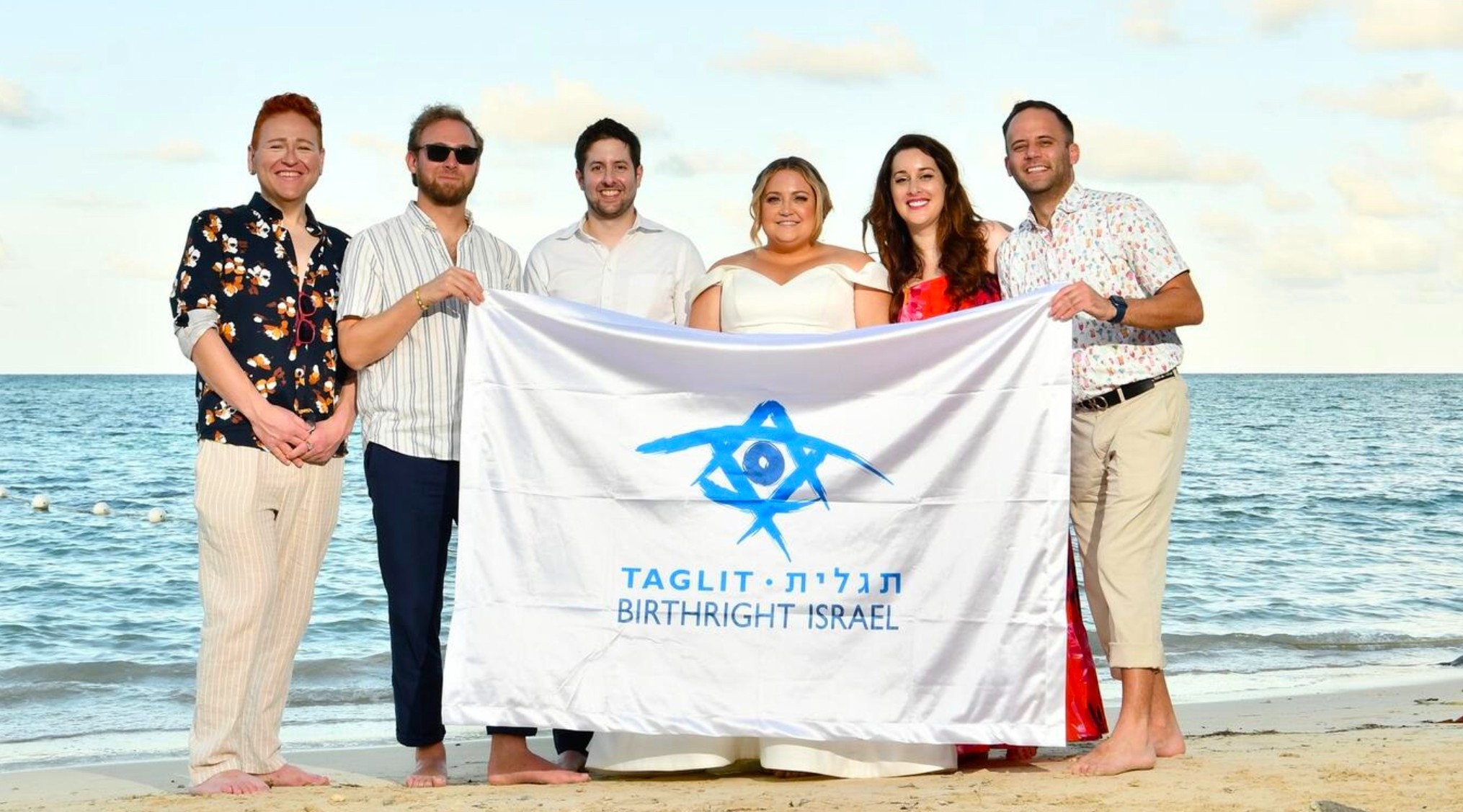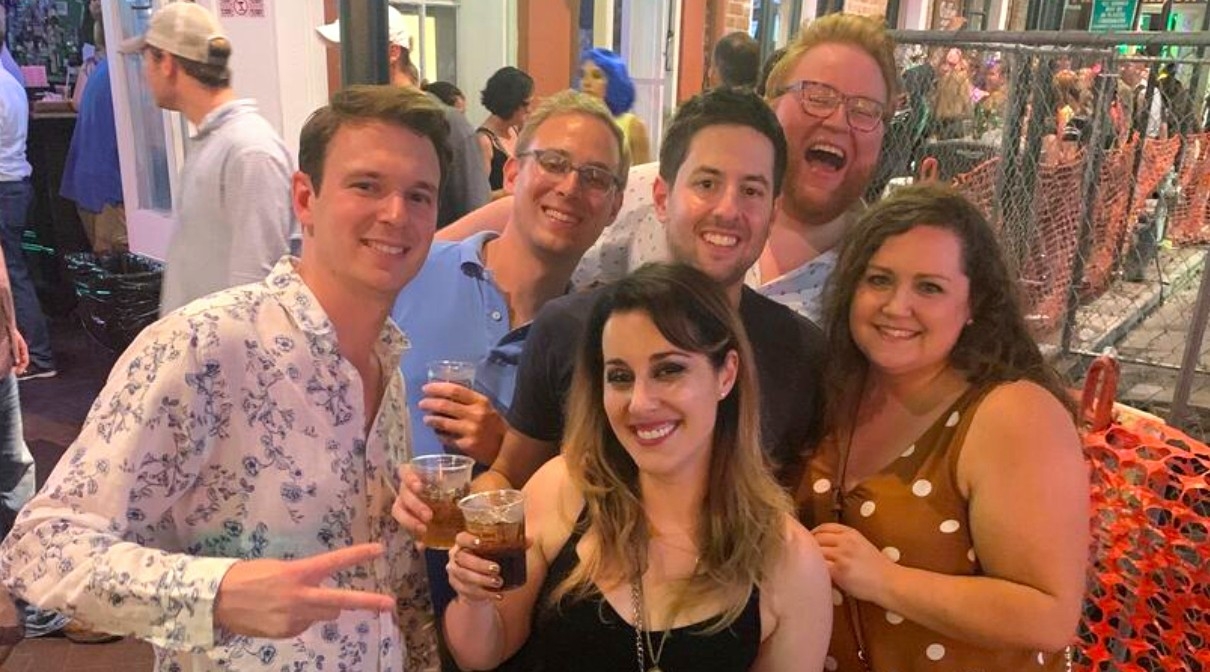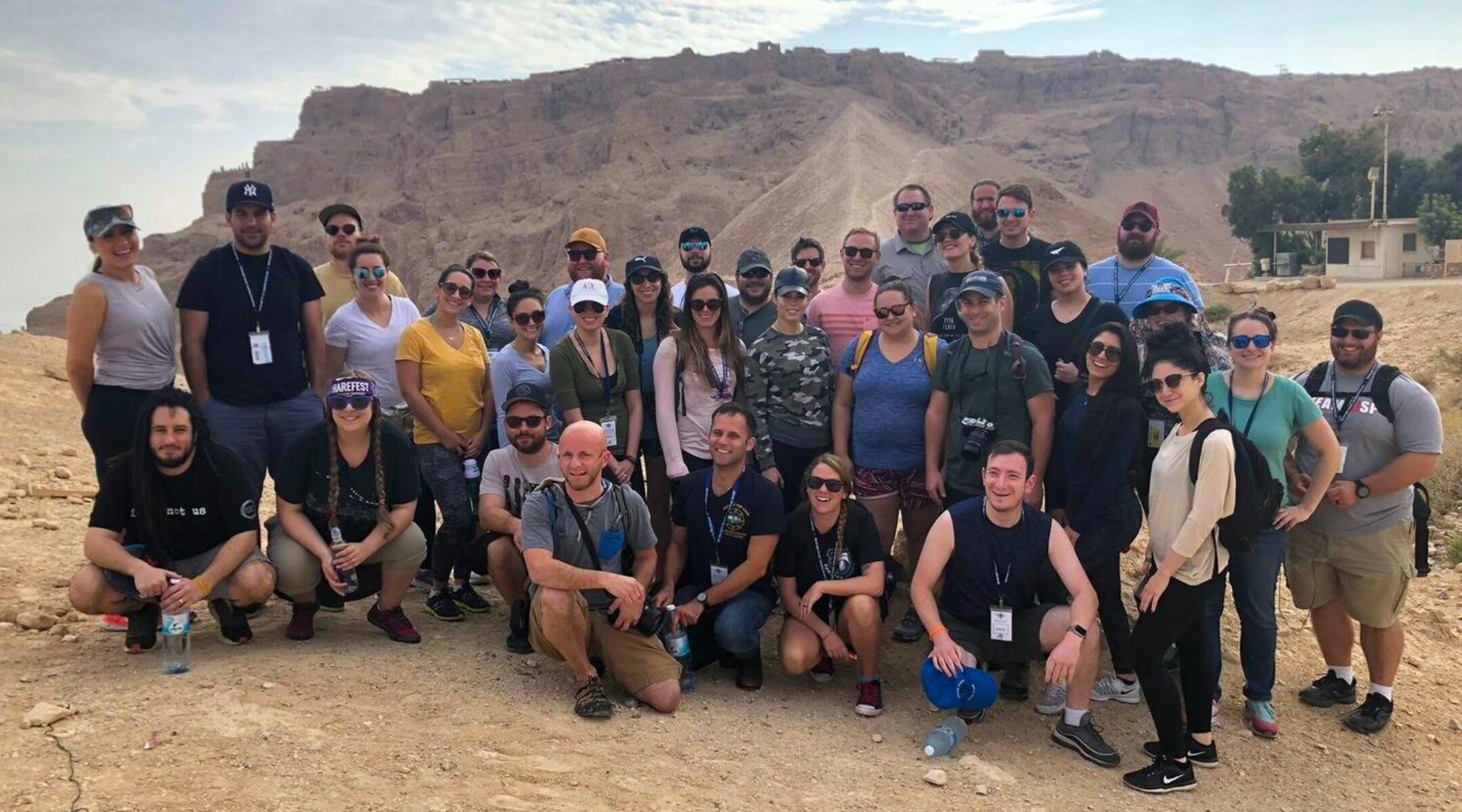When Ashley Inbar of Portland, Maine, got married in a traditional Jewish ceremony at the Jamaican beach resort of Ocho Rios in early January, there were five very special names on the guest list.
Just half a decade earlier, they were all complete strangers.
But then they met in Israel on an unusual Birthright trip geared toward “older participants” — those ages 27 to 32 — and forged bonds that have only grown over the years. When that 2018 trip drew to a close, six of them resolved to hold annual in-person reunions, despite the vast geographical distances that separate them.
“Pretty much right when we got home, we started planning to meet up somewhere,” said Inbar, who heads fundraising for the Jewish Community Alliance of Southern Maine. “Our first trip was to Denver, then we traveled north to Redstone, Colorado, and stayed for the weekend. As soon as we end one trip, we start planning the next one. We see each other as often as we can, and we talk every day through group chats on Instagram.”
The tight bonds established by the six friends — Inbar, Tim Campbell, Max Staplin, Carly Herbst, Simon Muller and Jared Glassman — are part of the goal of Birthright Israel, which seeks to offer participants a “life-changing experience.”
While forging bonds between Diaspora Jews and Israel is the main purpose of the trips, which are given to participants at no cost to them, the 10-day Birthright experience also aims to strengthen both participants’ Jewish identity and their connection to fellow Jews (including Israelis). Countless long-lasting friendships and romances that started on Birthright have blossomed into marriages and Jewish families.
From Inbar’s group five years ago, the vast majority of participants are still in touch, she said.
“There were 38 of us, and our entire group got along really well,” Inbar said. “We were all at similar places in life, and all of us already had careers. Even today, 95% of us are still connected through social media.”
During the pandemic, when the six couldn’t meet up in person, they held biweekly Zoom chats where they’d talk for hours on end, playing games and discussing the ups and downs of their lives — including engagements, illnesses, deaths of family members and job promotions — as well as their shared memories of their Israel experience.

Ashley Inbar, third from right, with her Birthright friends celebrates her January 6, 2023, wedding on the beach in Ocho Rios, Jamaica. (Courtesy of Ashley Inbar)
The group also stayed in touch with the Israeli security guard, Gal, who escorted them on the trip. Gal video-chats with the group at times of conflict in Israel to share his experiences on the ground — and at other times to practice his English. “He just became an integral part of our collective experience, and I think it was as impactful for him as it was for us,” Inbar said.
Staplin, 36, a franchise attorney in Philadelphia, says the 2018 Birthright trip was one of the best experiences of his life. While the tours to the Dead Sea and Masada were amazing and the vibrancy of Tel Aviv unforgettable, he said, what remains with him most are the friendships he formed during those 10 days.
“We’d stay up till 1 a.m. every night talking. We knew then that we’d be friends for the rest of our lives,” Staplin said. “We decided to have a reunion every year. The first was in New Orleans, then the next year we visited Ashley in Maine. As we were figuring out where to do the next reunion, Ashley got engaged.”
Since 1999, more than 800,000 young Jews from 68 countries have visited Israel on free 10-day trips offered through Birthright, known in Hebrew as Taglit (Discovery). The vast majority were 18 to 26, but from mid-2018 until recently some 13,000 Jews in the 27 to 32 age bracket got to visit Israel as well, according to Noa Bauer, Birthright’s vice president of global marketing.
Now that the pandemic has ended and trips to Israel are back in full force, the organization is seeing its highest demand ever and can’t accommodate all would-be participants without raising additional funds.
“Given the limited spots, we went back to the original age group of 18 to 26,” Bauer said, “though we did allow those who missed out during Covid to participate this past summer as a last chance even if they aged out during the pandemic.”
On Inbar’s trip, the cohort of older Birthright participants included two married couples and several people with children, including her.
Visiting Israel at an older age made all the difference to Glassman, a 36-year-old firefighter in New Orleans. He cited “a much higher maturity level” as one of the advantages of doing Birthright when he did.
“At 18 or 19, I wouldn’t have appreciated it as much,” Glassman said. “Everyone on our group really wanted to be there. In my case, as a young adult, I became much closer to my local Jewish community. I’m a pretty active member of my temple, Touro Synagogue, so when Birthright opened that slot for my age group, it was almost like it was meant to be.”
Staplin said that what really stood out from his experience was the 360-degree view of Israeli life and history that the Birthright trip gave him – not something he could have gotten on a typical vacation.

Six participants of a 2018 Birthright Israel trip gather for their annual reunion in 2022 in New Orleans, Louisiana. (Courtesy of Ashley Inbar)
“The most meaningful part was gaining an understanding of what day-to-day life is like in a country with so much history but still in the middle of so much conflict in present times,” he said. “Watching the people of Tel Aviv just going about their regular work days despite the announcement of the largest rocket attacks in years. Taking a bus ride through the middle of nowhere to Masada and learning about what happened there centuries before America was discovered, and then seeing the daily struggles of the Bedouins the next day. Going from the Western Wall to the Mahane Yehuda Market. Eating schnitzel in a kibbutz and then eating fancy Thai-fusion food at a restaurant in Tel Aviv.”
Herbst was 32 when she went on Birthright. Until then, she said, her travel priorities were to visit countries other than Israel, even though her older brother had gone on Birthright and had a positive experience.
“I wasn’t that interested at the age when you’re supposed to go,” Herbst said. “But our group had a different perspective. We weren’t looking just to get a free trip. Even my Jewish identity was certainly different for me in my 30s than in my 20s.”
Now 37, Herbst works in business development at a New York City tech startup.
“For me, what’s special about Israel is the enduring history of religion, and not only of Judaism,” she said. “Even seeing how strong of a presence Islam and Christianity has there was really fascinating for me. There’s no other place in the world where you see that.”
Muller, 37, grew up outside Rochester, New York, and was supposed to go on Birthright in his mid-20s. But a month before his planned trip, Muller lost his job after the congressional office where he was working in Washington, D.C., suddenly closed. He never got around to rescheduling the Israel trip, and then he aged out.
Nearly six years later, he said, he got an email that Birthright was doing a pilot program for older Jews.
“It was just before my 32nd birthday, I didn’t know anybody else,” Muller recalled. “It was a shot in the dark. I had low expectations.”
The trip turned out to be one of the milestones in his life.
“I found people I really clicked with,” said Muller, now an international trade consultant in Seattle. “We all live in different places and have different interests, but Birthright really bonded us. It’s been a wonderful experience.”
JTA has documented Jewish history in real-time for over a century. Keep our journalism strong by joining us in supporting independent, award-winning reporting.
This story was sponsored by and produced in partnership with Birthright Israel, which aims to give every young Jewish adult around the world the opportunity to visit Israel on an educational trip. This article was produced by JTA's native content team.
More from Birthright Israel





